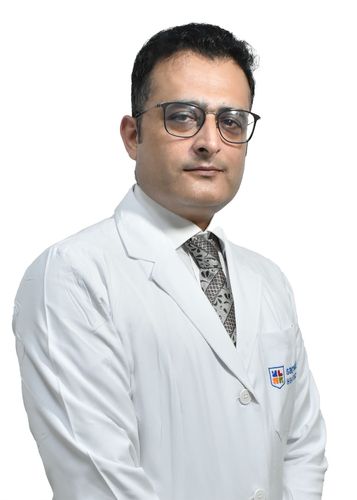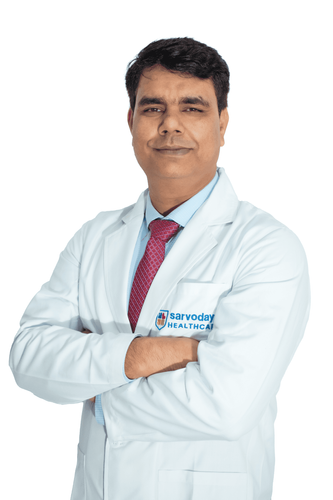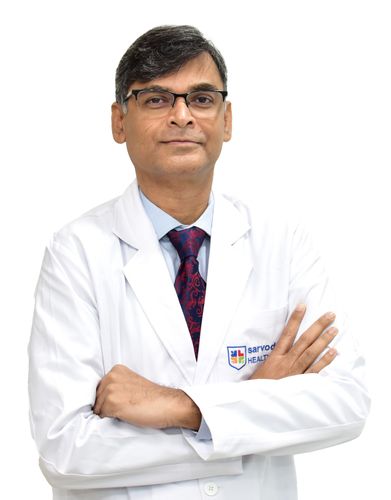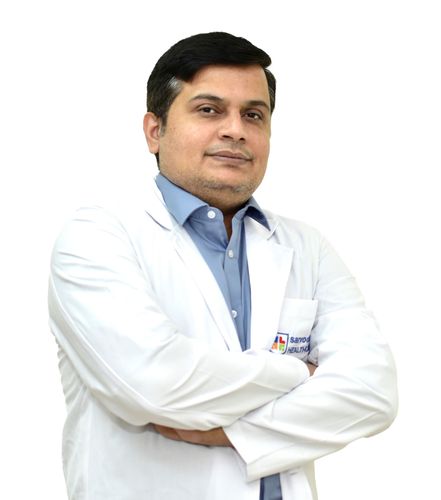Overview
Awake Brain Surgery is an advanced neurosurgical technique where the patient remains conscious during specific parts of the procedure. This approach helps protect areas responsible for speech, movement and memory by allowing real-time monitoring of brain functions. It is commonly used for tumours, epileptic foci and lesions located close to critical functional zones.
At Sarvodaya Hospital, our expert team offers safe and precise awake neurosurgery guided by highly experienced neurosurgeons. With advanced technology, including the CUSA Excel surgical system, Zeiss Tivato surgical microscope, along with a skilled anaesthesia team and some of the best neurosurgeons in Delhi NCR and Faridabad, we ensure accurate tumour removal while preserving essential functions. Patients across India trust our centre for world-class, patient-focused neurosurgical care.
When is Awake Brain Surgery Required?
Awake brain operation techniques are chosen when tumours or lesions are located near areas that control speech, movement, vision, memory, or behaviour. Conditions treated include brain tumours, epileptic foci, vascular malformations, and certain functional disorders.
Awake neurosurgery helps surgeons carefully identify and preserve essential brain regions while removing abnormal tissue. It is recommended when traditional surgery risks damaging critical pathways.
This technique also enables real-time testing of speech or movement, allowing the best neurosurgeon in India toensure safer outcomes and avoid neurological deficits.
Awake Brain Surgery Procedure
The treatment begins with a detailed neurological evaluation, MRI imaging, and planning through advanced brain mapping systems. On the day of surgery, anaesthesia experts keep the patient comfortable while maintaining safe wakefulness during specific phases. A precise opening is made in the skull, and the surgeon performs cortical and subcortical mapping to locate vital functional areas.
During the procedure, the patient may be asked to speak, move fingers, identify objects, or follow instructions, allowing the neurosurgeon to protect key regions.
Tumour removal or corrective surgery is then completed with high accuracy, supported by intraoperative monitoring. After closure, the patient is shifted to recovery for further observation.
Technology and infrastructure
Our awake brain surgery programme runs on a purpose-built neurotechnology platform to ensure precision, safety and excellent outcomes. We use advanced neuronavigation linked with preoperative functional MRI and tractography for surgical planning.
Intraoperative tools include high-definition surgical microscopes, fluorescence guidance, real-time ultrasound, and intraoperative CT or MRI when required. Continuous neurophysiological monitoring and cortical and subcortical mapping allow live assessment of speech and motor pathways during awake procedures.
A dedicated neuro anaesthesia team, specialised neuro ICU, and integrated neurorehabilitation services complete the care pathway, supported by a multidisciplinary team including neuroradiology and neurophysiology experts.
Benefits of Awake Brain Surgery
- Improved Functional Preservation: Real-time monitoring of speech, movement, and cognition helps avoid damage to essential brain regions.
- Greater Surgical Accuracy: Direct feedback from the patient allows precise tumour removal and mapping of vital pathways.
- Reduced Risk of Complications: Lower chances of postoperative speech loss, weakness, or cognitive decline.
- Better Long-Term Quality of Life: Patients often experience faster recovery and improved functional outcomes.
- Suitable for High Risk Tumours: Especially beneficial when tumours lie close to speech or motor control areas.
Post-Treatment Lifestyle Modifications
- Recovery requires close monitoring and a gradual return to daily activities.
- Follow a structured rehabilitation program, including speech therapy, physiotherapy, or occupational therapy as needed.
- Ensure adequate rest and proper sleep during the healing phase.
- Avoid heavy lifting, prolonged screen time, and stressful activities in the initial period.
- Maintain a balanced diet, stay hydrated, and take regular medications as prescribed.
- Attend follow-up visits with the neurosurgeon in Faridabad to track healing progress.
- Seek emotional support or counselling to help regain confidence and adjust during neurological recovery.
Why Choose Sarvodaya Hospital for Awake Brain Surgery?
- Highly experienced team led by the best neurosurgeon in Delhi NCR.
- Advanced neuro navigation, brain mapping, and monitoring systems.
- Comprehensive neurosurgical setup for awake procedures.
- State-of-the-art ICU and critical care support.
- Multidisciplinary team including neurologists, neuro-anaesthetists, and rehabilitation experts.
- Patient-centric approach ensuring safety, comfort, and precise outcomes.
- Proven expertise in complex awake neurosurgery cases.








